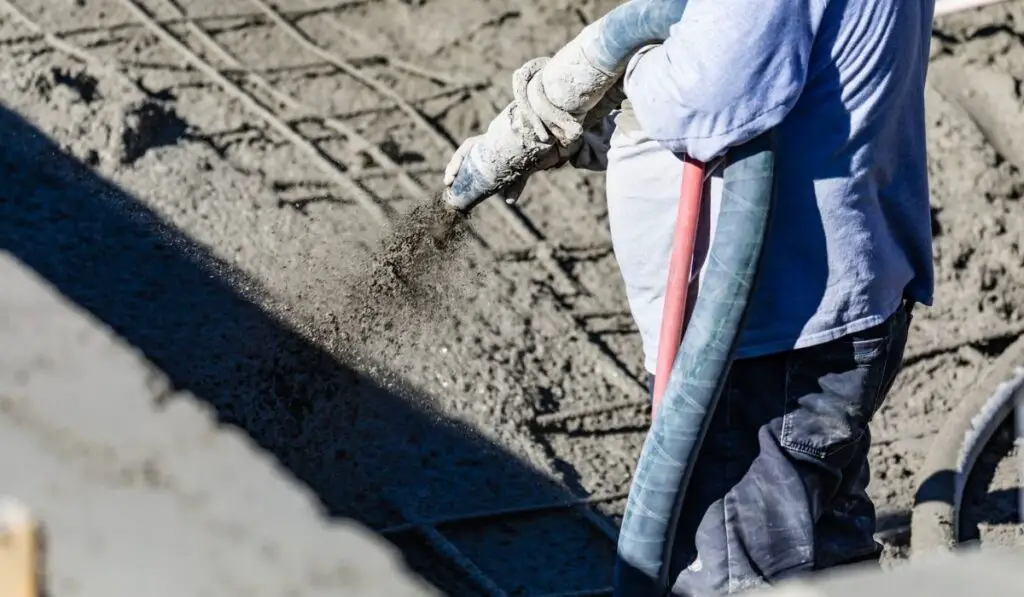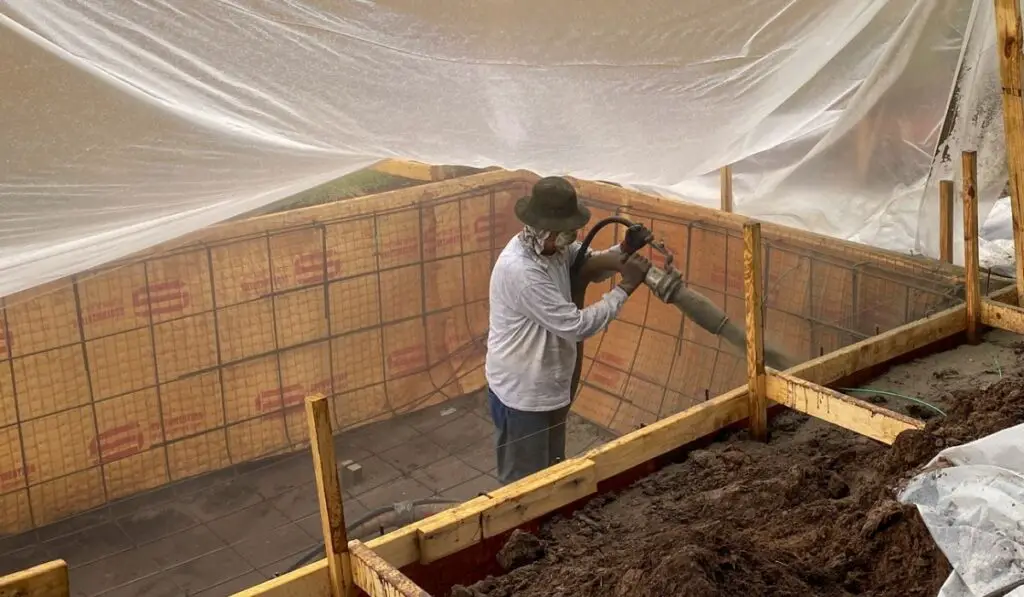As you may already know, there are three kinds of in-ground pools. They are fiberglass, concrete, and vinyl liners. And if you’re thinking about getting a concrete pool, you may have come across the term “gunite” a number of times, at least. If you’re looking for more information about gunite pools, you are in the right place. So, we’ll begin with the obvious and straightforward question: what is a gunite pool?
A gunite pool is a concrete blend of sand, water, and cement applied using a high-pressure hose. The materials cure and the gunite become as hard as a rock, forming a thick and solid structure coated with plaster to achieve a smooth surface. If maintained, they last longer than any other pool type.
Gunite pools allow exceptional levels of aesthetic quality and design flexibility. Unlike regular concrete, gunite material is applied one layer after the other, making them seamless and highly durable. As a result, gunite is the most popular pool found at many resorts and even homes. Let’s look at basic information about this material, its use in pool construction, its relationship with concrete, and the significant advantages of gunite pools.
What Is Gunite?

Gunite is a mixture of cement, sand, and water and can be considered the same thing as traditional concrete, except for one important thing. While regular concrete is poured into wooden frames one section after the other, gunite is applied one layer after the otherusingf a special spray gun.
That means, unlike regular concrete, which is poured, gunite surfaces are seamless, and this makes gunite pools highly durable.
The gunite process is a 1907 invention of a taxidermist called Carl Akely — who had a stint in industrial construction during his breaks from stuffing animal carcasses — to repair the Field Columbian Museum in Chicago.
Gunite passes dry concrete mixture through a hose or tube. Water is added to the dry mix in a nozzle where the hose ends, and the already mixed concrete is then fired onto any concrete directed at.
Gunite ends up as a relatively thin sheet of wet concrete fired at high pressure and sprayed onto any surface that it can adhere to.
Combining high pressure with the very last second mixture of water and the dry concrete has to be done perfectly; otherwise, the final mixture may turn out to be too dry or too wet to adhere properly to the intended surface. Therefore, in gunite construction, the talent and skill of the nozzleman are essential to control the passage of water and dry mix at the nozzle.
Since a compressed air gun is used, builders can apply concrete on curved and vertical surfaces. Apart from being one of the common options for installing inground pools, gunite is also a popular choice for projects like road tunnels.
Maintenance is critical with a gunite pool, maybe slightly moreso than other pool types. Because pH issues can lead to degradation of plaster coatings and the gunite itself, a good test kit like the WWD Swimming Pool Chemical Test Kit (on Amazon) should be used to monitor treatment levels regularly, and over time if the odd crack forms in the plastic coating, you should keep a kit like the Pool Patch Plaster Repair Kit (also on hand) to fix any of these issues.
Differences Between Gunite And Concrete
There are two main differences between gunite and concrete. Firstly, while concrete uses small and big aggregates, gunite uses only small particles. The second difference has to do with adding the water.
As we mentioned previously, concrete is already mixed. But in the case of gunite, a dry mix is blasted out of a hose, and water is added during the delivery.
In contrast to concrete, you can start and stop building gunite pools without any issues, which helps achieve a smooth finish. A skilled nozzleman can adjust the water and cement mix as necessary at the point of delivery. It also has less chance of cracking compared to concrete.
Pros and Cons Of A Gunite Pool
Here are some pros and cons of gunite pools:
Pros of gunite pools
- More returns on your investment: Pools like these require less maintenance which makes them suitable for homeowners who are looking to upgrade their properties. This pool is highly durable and lasts for a long time, making it a great investment as it reduces future expenses on your property.
- A rock-solid foundation: A gunite pool is great because it comes in various amazing designs. These pools last longer than other inground pools and usually come with the best warranties. No wooden framework is required to hold the shape of gunite pools, so they have a simpler construction than standard concrete. They can withstand a lot of stress and pressure. This keeps your property safe and prevents damage to your backyard oasis.
- Easily customizable designs: Our professionals can construct gunite pools in all kinds of pool designs. Moreover, the steel framework combined with this material helps maintain the shape and durability of gunite pools over time.
- Unlimited versatility: Gunite pools come in various shapes and sizes. This helps minimize the landscape factor since you can build a shape that conforms with your available space. They are designed and constructed on-site. Hence, there are endless design choices.
Cons of gunite pools
- Pool draining may be dangerous: Due to the nature of the product, it is important to drain this pool carefully. If the water table (groundwater) is high, the gunite pool can be elevated, which can cause significant damage if it is drained improperly.
- Yearly maintenance is costly: Due to the porosity of the surface, you must prevent algae by using additional maintenance and chemicals. The alkaline pH of the pool shell also increases the water’s pH regularly, so acid must be added regularly to NEUTRALIZE this effect.
- Installation time: The construction of a gunite pool from scratch will take anything from two to three months or more.
How Are Gunite Pools Made?
To construct a new gunite pool, the first thing to do is dig the pool shape of your choice and then install the iron rebar. The pool structure is reinforced by the grid formed by the framework around the pool perimeter.
Gunite is spray-coated on the rebar, smoothed, and then left to dry. Once dry, you may customize the pool finish according to your taste. Plaster is the most widely used finish, but the tiled or pebbled finish is suitable for a unique, luxurious look.
How Much Does A Gunite Pool Cost?

Gunite swimming pools have always been priced from $55,000 to $100,000 for a turnkey installation, including essential options. But in the Covid-19 era pool market today, there are hardly any gunite pool installations below $100 000.
Since it is possible to customize gunite pools (and shotcrete pools) to any depth, size, and shape, with any kind of shape possible, they can cost more than six figures, even if you’re looking to install a gunite pool that’s smaller with a less distinctive design.
How To Maintain A Gunite Pool
If you own a gunite pool, there are some things to consider concerning the maintenance of your pool:
- A gunite surface is porous, which means your pool may be prone to algae. You can prevent the growth of algae by using chemicals and filtration and brushing the pool often to remove algae.
- You may need to redo your gunite swimming pool surface as it wears over time. It is essential to refinish the surface quickly to keep it smooth and attractive.
- It can be expensive to maintain a gunite pool over time. The average cost of owning shotcrete gunite pools over a period of 10 years is $2,700 per year.
